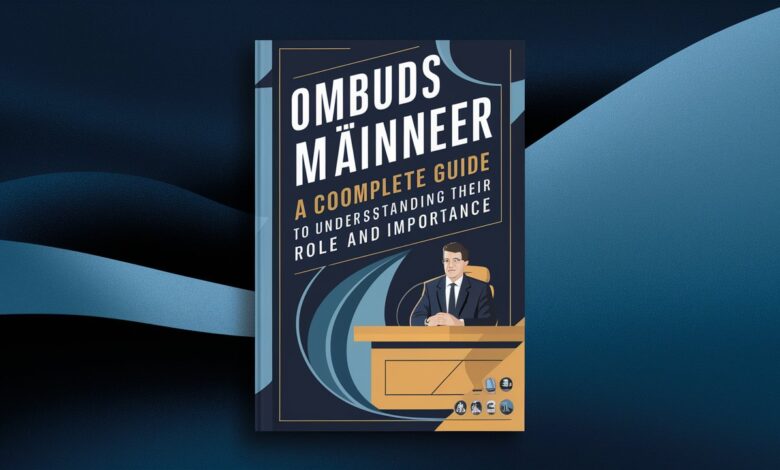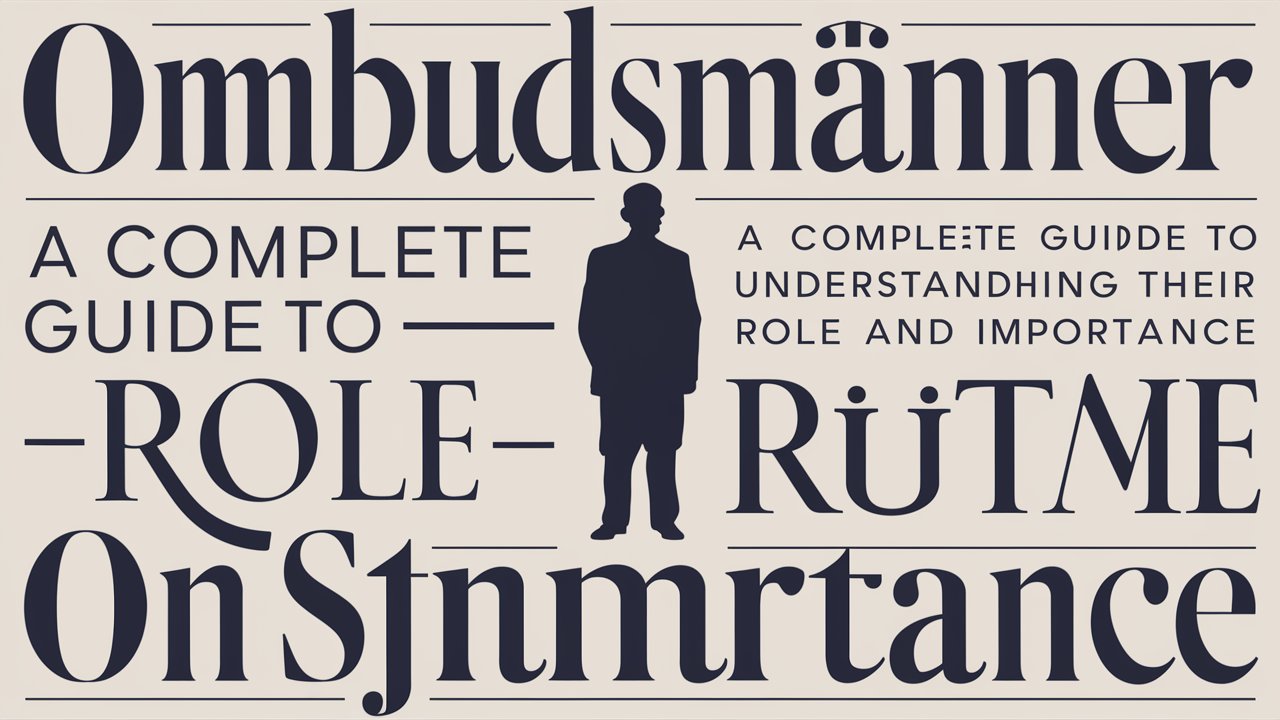Ombudsmänner: A Complete Guide to Understanding Their Role and Importance

In today’s complex world of governance, corporate responsibility, and public accountability, the role of ombudsmänner has become more relevant than ever. These independent mediators serve as a bridge between organizations and individuals, ensuring that fairness, transparency, and justice remain at the core of every process. Whether in government, business, healthcare, or education, ombudsmänner play an essential role in protecting rights, resolving disputes, and promoting ethical practices.
In this article, we provide a comprehensive and detailed overview of ombudsmänner, their responsibilities, legal framework, benefits, and how they differ across various sectors. By the end, you will understand why ombudsmänner are indispensable for a fair society and transparent institutions.
What is an Ombudsmann?
The term ombudsmann originates from Sweden and refers to a person appointed to investigate complaints made by individuals against organizations, institutions, or government authorities. Unlike regular authorities, ombudsmänner operate independently and impartially, ensuring that all parties are heard fairly. They do not pass binding judgments like courts but make recommendations, mediate disputes, and highlight systemic problems that need reform.
An ombudsmann’s primary mission is to protect citizens’ rights, uphold ethical standards, and encourage accountability. This unique position has spread worldwide, adapting to different legal and cultural frameworks, but always maintaining independence and neutrality.
The Key Responsibilities of Ombudsmänner
1. Complaint Investigation
One of the core duties of ombudsmänner is investigating complaints lodged by individuals or groups who feel wronged by an institution. These complaints can range from unfair treatment in government services to workplace harassment cases in corporations. Ombudsmänner analyze evidence, interview involved parties, and recommend solutions.
2. Mediation and Conflict Resolution
Ombudsmänner act as mediators between conflicting parties. Unlike traditional dispute mechanisms, their goal is not punishment but reconciliation. They facilitate dialogue, encourage understanding, and propose practical solutions that satisfy both sides.
3. Promoting Transparency and Accountability
By evaluating complaints and systemic issues, ombudsmänner hold institutions accountable. They highlight areas where policies fail, where corruption may exist, or where processes lack transparency. Their reports often influence reforms in governance and corporate management.
4. Protection of Rights
Ombudsmänner safeguard individual rights and freedoms, ensuring no one is subject to discrimination, abuse, or unfair treatment. They often work closely with human rights commissions and labor organizations to enforce equality.
5. Policy Recommendations
Through case reviews and complaint analysis, ombudsmänner identify systemic issues. They issue policy recommendations that help organizations improve their systems, prevent future conflicts, and strengthen ethical compliance.
Types of Ombudsmänner Across Different Sectors
Government Ombudsmänner
These officials monitor government agencies and public authorities. They ensure citizens are treated fairly in legal, administrative, and bureaucratic processes. In many countries, government ombudsmänner address issues such as corruption, misuse of power, and lack of transparency.
Corporate Ombudsmänner
Within private organizations, corporate ombudsmänner handle internal disputes such as workplace conflicts, discrimination complaints, and whistleblower cases. They create a safe environment where employees can raise concerns without fear of retaliation.
Healthcare Ombudsmänner
In healthcare systems, ombudsmänner play a critical role in resolving disputes between patients and providers. They handle complaints about medical negligence, billing issues, and access to care, ensuring fairness for both patients and practitioners.
Educational Ombudsmänner
Educational ombudsmänner work in schools, colleges, and universities to address complaints from students, parents, and staff. They often handle issues such as grading disputes, disciplinary actions, and academic fairness.
Financial Ombudsmänner
These ombudsmänner operate in the banking and insurance industries, mediating between customers and financial institutions. They ensure compliance with consumer protection laws and help resolve disputes over loans, credit, and claims.

The Legal Framework of Ombudsmänner
The authority and power of ombudsmänner vary across countries, but their independence is a fundamental principle. In most nations, ombudsmänner are established by law or constitution, ensuring their autonomy from government and corporate influence.
Their legal framework allows them to request documents, question witnesses, and demand cooperation from institutions. While their recommendations may not be legally binding, institutions usually comply to maintain credibility and public trust.
Why Ombudsmänner Are Important for Society
Ensuring Fair Treatment
Ombudsmänner act as guardians of fairness, ensuring individuals are not mistreated or silenced by powerful institutions.
Strengthening Public Trust
By addressing complaints and exposing misconduct, ombudsmänner restore faith in public and private institutions. Citizens feel confident knowing there is a neutral authority safeguarding their rights.
Preventing Escalation of Disputes
Through mediation, ombudsmänner resolve issues before they reach courts, saving time, money, and resources for both individuals and organizations.
Encouraging Ethical Conduct
Ombudsmänner encourage organizations to adopt transparent and ethical practices, helping prevent corruption, discrimination, and abuse of power.
Challenges Faced by Ombudsmänner
Despite their importance, ombudsmänner encounter several challenges:
-
Limited authority: Their recommendations are often not binding, making enforcement difficult.
-
Institutional resistance: Some organizations may resist cooperation or ignore recommendations.
-
Resource constraints: Lack of funding and staff can hinder their effectiveness.
-
Public awareness: Many people are unaware of ombudsmänner’s role and fail to seek their assistance.
Future of Ombudsmänner in a Globalized World
As societies become more complex and interconnected, the role of ombudsmänner will expand. With increasing emphasis on human rights, corporate responsibility, and transparency, ombudsmänner are expected to play a greater role in shaping fair institutions worldwide. Digitalization also presents new opportunities, allowing ombudsmänner to handle online complaints, virtual mediation, and data-driven investigations.
The demand for independent oversight and impartial conflict resolution will only grow, making ombudsmänner more vital than ever.
Conclusion
Ombudsmänner are not just complaint handlers; they are pillars of fairness, transparency, and justice in society. By mediating disputes, safeguarding rights, and holding institutions accountable, they help build trust between citizens and organizations. Whether in government, healthcare, education, or business, the role of ombudsmänner is irreplaceable in creating an equitable and ethical environment.
FAQ About Ombudsmänner
Q1: Are ombudsmänner legally binding authorities?
No, ombudsmänner usually provide recommendations rather than binding decisions, but their influence is strong due to public trust and institutional credibility.
Q2: Can anyone file a complaint with an ombudsmann?
Yes, in most cases, any individual who feels unfairly treated by an institution can file a complaint.
Q3: How do ombudsmänner differ from courts?
Unlike courts, ombudsmänner focus on mediation and fairness, not legal enforcement. They provide faster and less costly resolutions.
Q4: Do all countries have ombudsmänner?
Many countries have ombudsmänner, but their powers and structures differ depending on national laws and governance systems.
Q5: Why are ombudsmänner important for businesses?
They provide employees and customers with a safe way to raise concerns, ensuring companies maintain transparency, trust, and ethical operations.



